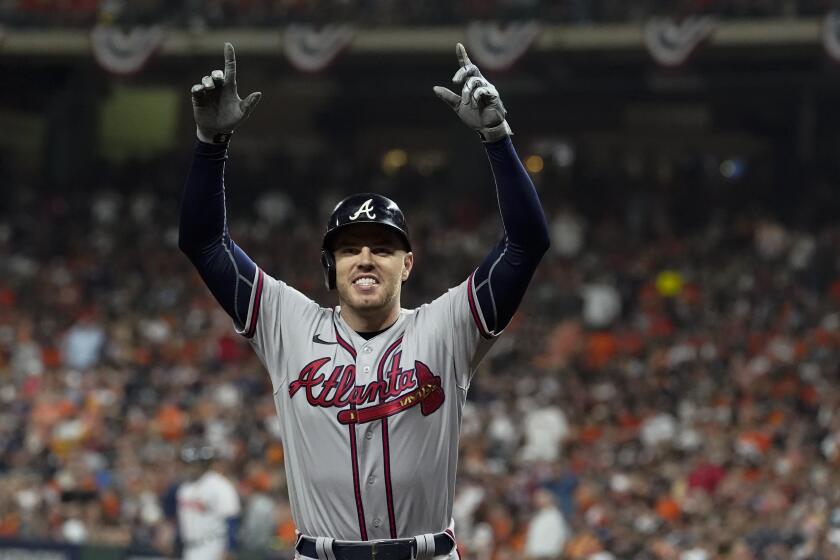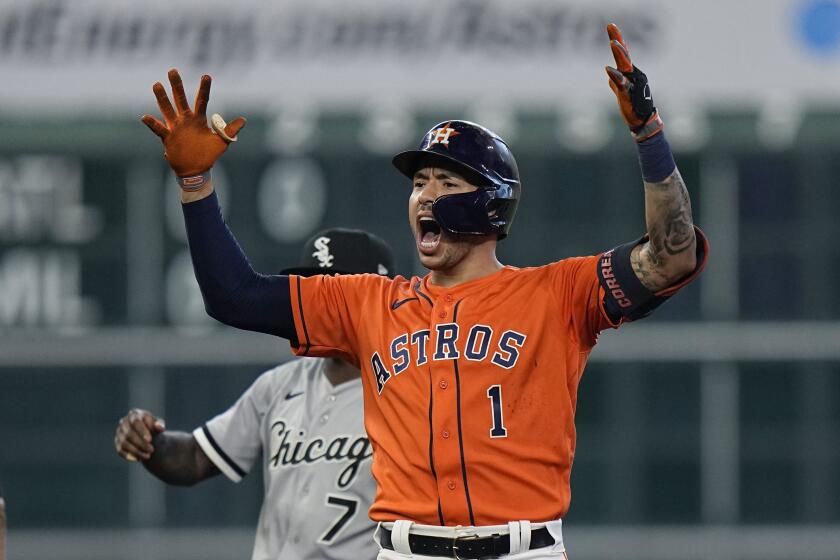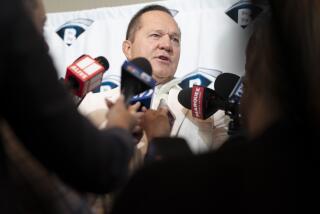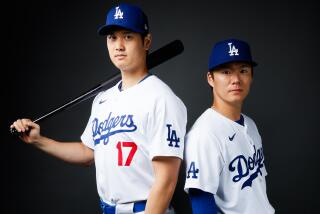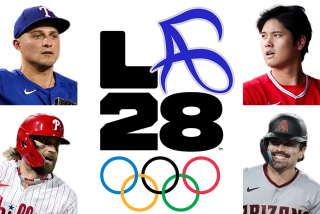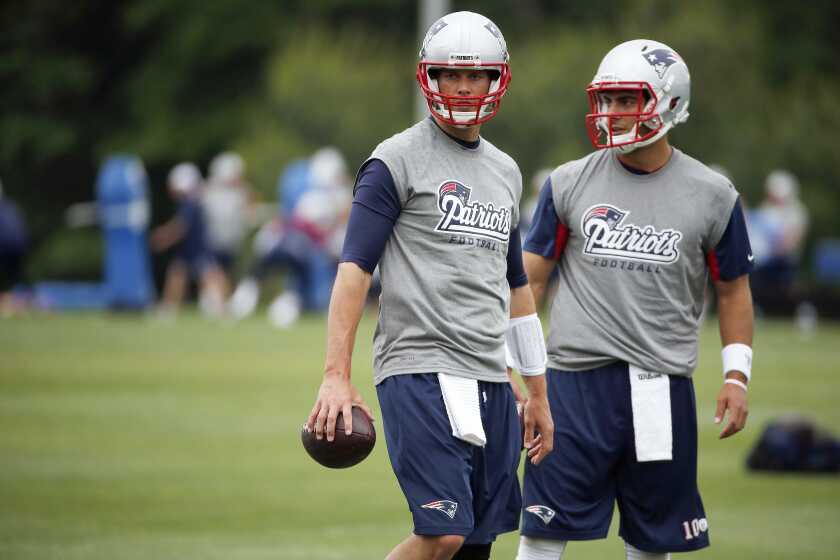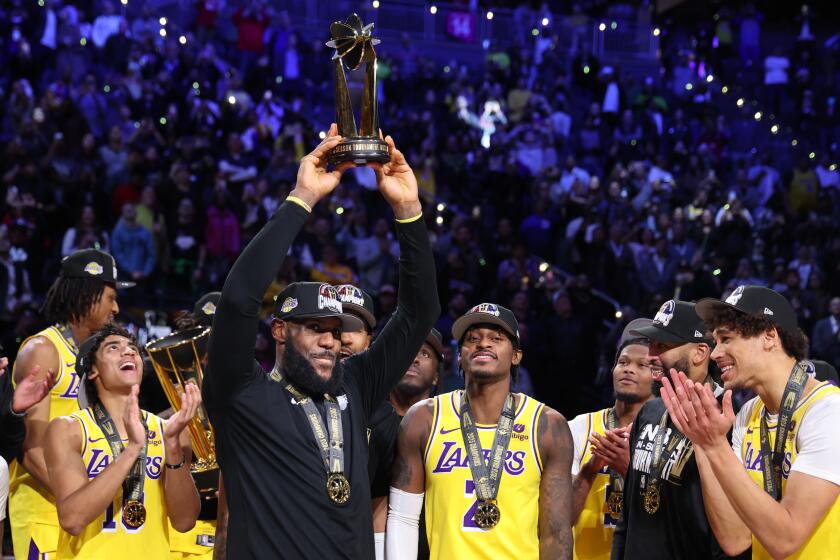MLB lockout ends as players and team owners agree to new contract terms

Major League Baseball is (finally) ramping up. Bill Plashke, Jorge Castillo, Jack Harris and Mike DiGiovanna break down each team’s to-do list before the start of the 2022 season.
Better late than never: Play ball!
Can the Dodgers get back to the World Series? Can Mike Trout and Shohei Ohtani carry the Angels into the playoffs? Was last year’s epic pennant race between the Dodgers and San Francisco Giants a onetime classic, or the start of another stellar chapter in the storied rivalry?
A long winter reduced to debates about tax rates and bonus pools has ended, and baseball’s spring finally has dawned. Three months after major league owners locked out players and declared not another game would be played without a new collective bargaining agreement, the league and the players’ union agreed Thursday on a five-year deal.
The deal includes a full 162-game season this year, starting April 7.
“I am genuinely thrilled to be able to say that Major League Baseball is back,” Commissioner Rob Manfred said, “and we’re going to play 162 games.”
The changes most visible to fans: an expansion of the playoffs from 10 to 12 teams and the addition of the designated hitter to the National League.
The game will revert to traditional extra-inning rules, ending the experiment of starting each extra inning with a runner on second base in an attempt to hasten an ending. And, starting next year, every team will play every other team at least once during a season.
The Angels, for example, would play fewer games against division rivals, including the Seattle Mariners and Texas Rangers. They would play the Colorado Rockies every year, home or away, so that baseball fans in Denver would see the likes of Trout and Ohtani once every two years, rather than once every nine years.
The deal, ratified later Thursday by players and owners, sparked an immediate scramble for teams to open training camps and players to get there. Major league camps had been set to open the week of Feb. 14, and exhibition games had been scheduled to start Feb. 26.
Now that the lockout is over, the Dodgers have to improve their roster to get back to the World Series. Getting Freddie Freeman from the Braves is a start.
The players who show up in camp in coming days do not figure to include all the ones who will break camp with teams. Clayton Kershaw, Freddie Freeman and Carlos Correa headline the group of about 200 remaining major league free agents — that is, more than six free agents for every team. Many will be left with a minor league contract to get into camp this year, and hope for a guaranteed deal next year.
All the trade talk put on hold when the lockout was imposed can resume. The Oakland Athletics, for instance, could cut costs by trading a raft of core players, including first baseman Matt Olson, third baseman Matt Chapman and pitchers Chris Bassitt, Sean Manaea and Frankie Montas. The Cincinnati Reds have dangled pitchers Luis Castillo and Sonny Gray.
By locking out players in December, ahead of what he knew would be a contentious negotiation, Manfred bet he could get a deal done without losing any games and without risking a player strike. It wasn’t pretty, but he won the bet.
Since 1995, when owners surrendered on the pursuit of a salary cap, baseball had enjoyed labor peace. However, the rise of analytics and the failure of the union to react accordingly in negotiations for the previous labor agreement set up a confrontation when it came time to negotiate a new deal.
Revenues had risen, but salaries had not. Analytics showed the prudence of paying a player for what he was projected to do in coming years rather than for what he had done in past years, encouraging owners to emphasize younger, cheaper players. The vast majority of owners treated the luxury tax threshold as a de facto salary cap, even as players agreed to cost controls for draftees and international signees.
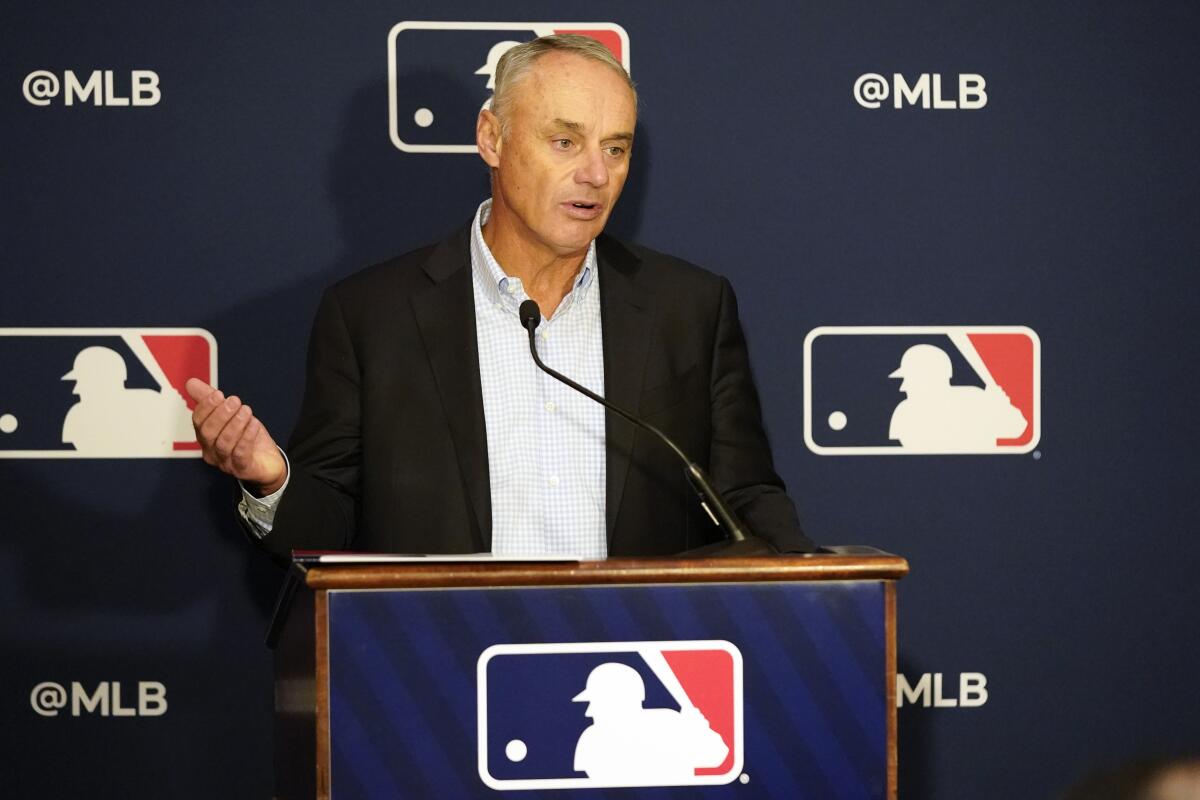
The owners, of course, were content with the old system. The players demanded major change: more money to the younger players that provided owners with the greatest value, and relaxation of the threshold so teams could not routinely cite the luxury tax as an obstacle to acquiring talent.
Initially, the players asked owners to lower eligibility for salary arbitration from three years to two, and for free agency from six years to five.
The owners flatly denied those terms. They did agree to pay more to players not yet eligible for arbitration, and to allow teams to spend as much as $20 million more on payroll this year without paying the luxury tax.
The labor talks were delayed at times, angry at other times. In a letter to fans Dec. 2, Manfred said he hoped the lockout would “jumpstart the negotiations.”
Instead, the owners did not make another proposal to the players until Jan. 13. The two sides met sporadically thereafter. On Feb. 21 — one week after players were scheduled to report to spring training, and four days after the league called off the first week of exhibition games — owners and players launched daily negotiations.
Those collapsed, and Manfred said the first week of the regular season would be called off too. On Wednesday, Manfred said the second week would be called off as well — but, less than 24 hours later, the league agreed to play the season in full.
The end result: labor peace restored through 2026, but a winter devoid of baseball buzz, and the second-longest work stoppage in MLB history.
In his news conference Thursday, Manfred said he would work to improve his relationship with players who widely distrust and deride him. During the prolonged talks, players shared photographs of Manfred practicing his golf swing, and of his country club golf scorecards.
“One of the things that I’m supposed to do is promote a good relationship with our players,” he said. “I’ve tried to do that. I think that I have not been successful in that.”
Major League Baseball has a new collective bargaining agreement and about 250 free agents are now ready to find new teams.
As the lockout dragged into a fourth month, the acrimony between the sides threatened to damage the long-term health of the sport. But Chicago Cubs second baseman Nico Hoerner, who attended a workout at the union’s training camp in Mesa, Ariz., on Thursday, believes players can restore fans’ trust in them and the game.
“I have a lot of trust in the quality of players we have in the game right now, and obviously, the more that they’re on the field, the better for the fans,” Hoerner said. “I’m really grateful for the fans that will stick with us through these times. I’m right there with you.
“I want to see great baseball being played. We all just want to play, and we promise that we have the best interests in the game in mind and will keep that as a priority.”
Times staff writers Mike DiGiovanna and Jorge Castillo contributed to this story.
More to Read
Go beyond the scoreboard
Get the latest on L.A.'s teams in the daily Sports Report newsletter.
You may occasionally receive promotional content from the Los Angeles Times.

